Scuba diving, a gateway to the mysteries of the deep, has captivated adventure enthusiasts worldwide. Defined by its immersive exploration beneath the waves, scuba diving offers a unique blend of excitement and tranquility. In this article, we will delve into the world of scuba diving, catering especially to beginners who wish to embark on this thrilling underwater journey.
Gear Up for Unforgettable Dives
Before embarking on your scuba diving journey, make sure you have the right gear to enhance your experience. Scuba diving gear includes several essential items such as masks, snorkels, fins, wetsuits, and BCDs (buoyancy control devices).
Investing in quality scuba diving gear not only ensures your safety but also enhances your comfort and overall diving experience. Whether you’re a beginner or an experienced diver, the latest advancements in scuba gear technology can make a real difference to your underwater exploration.
When choosing your gear, consider your diving style, body type, and the diving conditions of your chosen location. Make sure to choose items that fit well, and always test your equipment before diving.
| Essential Scuba Diving Gear | Advanced Scuba Diving Gear |
| Mask | Dive Computer |
| Snorkel | Drysuit |
| Fins | Rebreather |
| Wetsuit | Dive light |
| BCD (buoyancy control device) | Underwater camera |
It’s essential to keep your scuba diving gear properly maintained. Rinse your gear after every dive, store it in a cool, dry place, and avoid exposing it to direct sunlight. Ensure your equipment is regularly checked and serviced by a professional to keep it in good working order.
Dive into Learning: Scuba Diving Lessons
If you’re eager to experience the wonder of underwater life, the first step is learning how to scuba dive. Scuba diving lessons are essential for beginners, helping you master the basics of diving techniques, safety procedures, and underwater communication.
There are various types of scuba diving lessons available, from beginner courses to advanced certifications. Choose the one that suits your level of experience and diving ambitions. The most common diving courses include Open Water Diver certification and Advanced Open Water Diver certification, while specialized training is available for specific diving skills, such as deep diving or wreck diving.
During scuba diving lessons, you’ll learn from experienced instructors who provide hands-on training and guidance, as well as tips on how to stay safe and enjoy your dives to the fullest. Make sure to research the best dive centers or schools near you and book your lessons with a professional, certified instructor.
Why Take Scuba Diving Lessons?
While it may seem tempting to skip ahead and rent equipment for your first dive, taking scuba diving lessons is critical to ensure your safety and enjoyment while diving. By participating in diving courses, you’ll gain essential knowledge and skills, such as:
- The importance of dive planning and preparation
- Maintaining and using scuba gear safely
- Proper buoyancy control and equalizing
- Recognizing and responding to emergencies
- Effective underwater communication
By taking scuba diving lessons, you’ll also have the opportunity to meet like-minded individuals who share your passion for diving.
Whether you are pursuing diving as a hobby or covet a career in this industry, investing in scuba diving lessons is worth it. It not only boosts your self-confidence but also allows you to enjoy a rewarding and adventurous lifestyle by expanding your opportunities for exploration and travel.
Dive Deeper: Scuba Diving Certification
You’ve just completed your scuba diving lessons, and now you’re ready to take the next step: scuba diving certification. Becoming a certified scuba diver is essential if you want to embark on more challenging and rewarding diving experiences.
The process of obtaining a scuba diving certification involves completing a series of training dives, where you’ll learn advanced diving techniques, safety procedures, and underwater communication skills. You’ll also have to pass a written exam to ensure your understanding of the fundamental principles of scuba diving.
Several organizations worldwide offer scuba diving certifications, including PADI (Professional Association of Diving Instructors), SSI (Scuba Schools International), and NAUI (National Association of Underwater Instructors), among others. Each organization provides different levels of certification, ranging from Open Water Diver to Master Scuba Diver and beyond.
Benefits of Scuba Diving Certification
Becoming a certified scuba diver offers numerous benefits. With a scuba diving certification, you’ll have access to more dive sites, including deeper and more challenging dives. You’ll also have the opportunity to rent or purchase scuba diving equipment and participate in diving trips, liveaboards, and other diving-related activities.
Furthermore, becoming a certified scuba diver means that you’ll have the necessary knowledge and skills to dive safely, reducing the risk of accidents and injuries. You’ll also gain a better understanding and appreciation of the underwater world, promoting marine conservation and responsible diving practices.
Scuba Diving Certification Levels
| Certification Level | Organization | Description |
| Open Water Diver | PADI | The third certification level is where you’ll learn how to prevent and manage diving emergencies. |
| Advanced Open Water Diver | SSI | The third certification level, is where you’ll learn how to prevent and manage diving emergencies. |
| Rescue Diver | NAUI | The second certification level is where you’ll build upon your skills and knowledge as a scuba diver. |
| Master Scuba Diver | PADI | The highest non-professional certification level, where you’ll gain advanced training and experience in various scuba diving specialties. |
Obtaining a scuba diving certification is a significant accomplishment that will enrich your life with incredible diving experiences. With the right training and experience, you’ll be able to explore the wonders of the underwater world and embark on thrilling adventures that you’ll remember for a lifetime.
Unveiling Hidden Treasures: Scuba Diving Locations
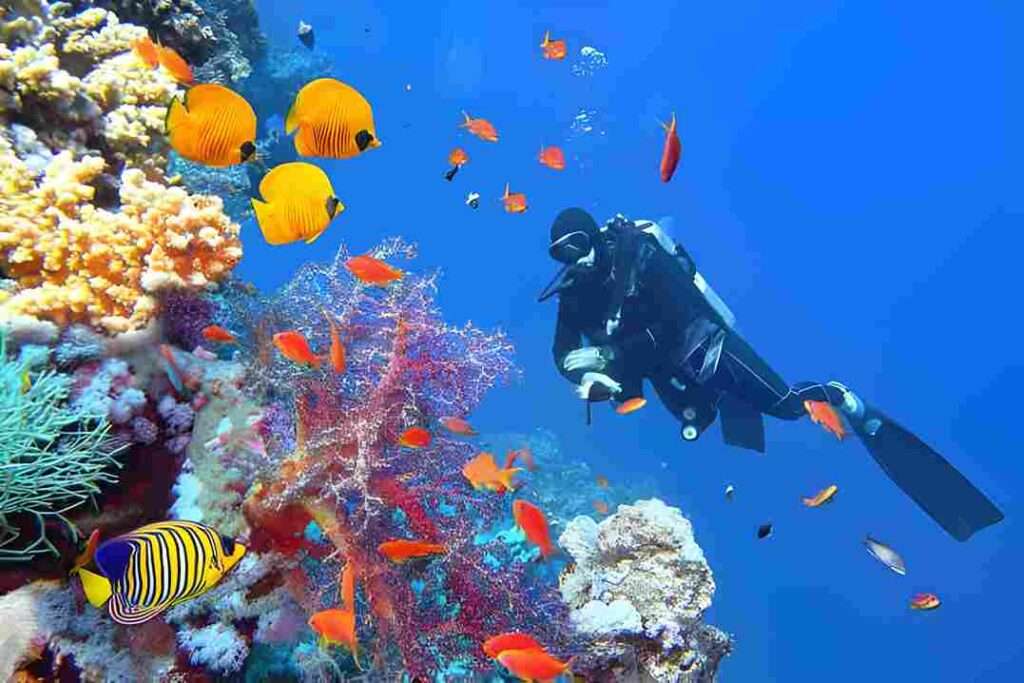
The world is teeming with unique and breathtaking scuba diving locations, each offering a unique underwater paradise to explore. From vibrant coral reefs to fascinating marine life, scuba diving destinations are a perfect escape for adventure seekers and nature enthusiasts alike. Here are some of the most stunning scuba diving locations:
| Location | Best Time to Dive | What to Expect |
| The Great Barrier Reef, Australia | June to October | Experience an abundance of colourful coral, tropical fish, and magnificent marine creatures including whale sharks and giant clams. |
| The Cayman Islands | Year Round | Explore stunning wall dives and the famous Kittiwake wreck, discover the vibrant coral reefs, and come face to face with marine life like stingrays and turtles. |
| Cenotes, Mexico | December to April | Go on magical cave dives and swim in crystal clear water surrounded by awe-inspiring rock formations and underground caverns. |
| Bali, Indonesia | April to November | Immerse yourself in a world of sea turtles, manta rays, and diverse macro life in this tropical paradise. |
| The Red Sea, Egypt | Year Round | Discover vibrant coral reefs and a rich marine life including dolphins, sharks, and schooling fish. The clear waters and variety of dive sites make the Red Sea an ideal destination for all divers, from beginners to experts. |
No matter where your scuba diving adventure takes you, always remember to dive with care and respect for the ocean’s delicate ecosystem. With so many stunning scuba diving locations waiting to be explored, it’s time to pack your gear and start your underwater journey.
Dive Responsibly: Scuba Diving Safety
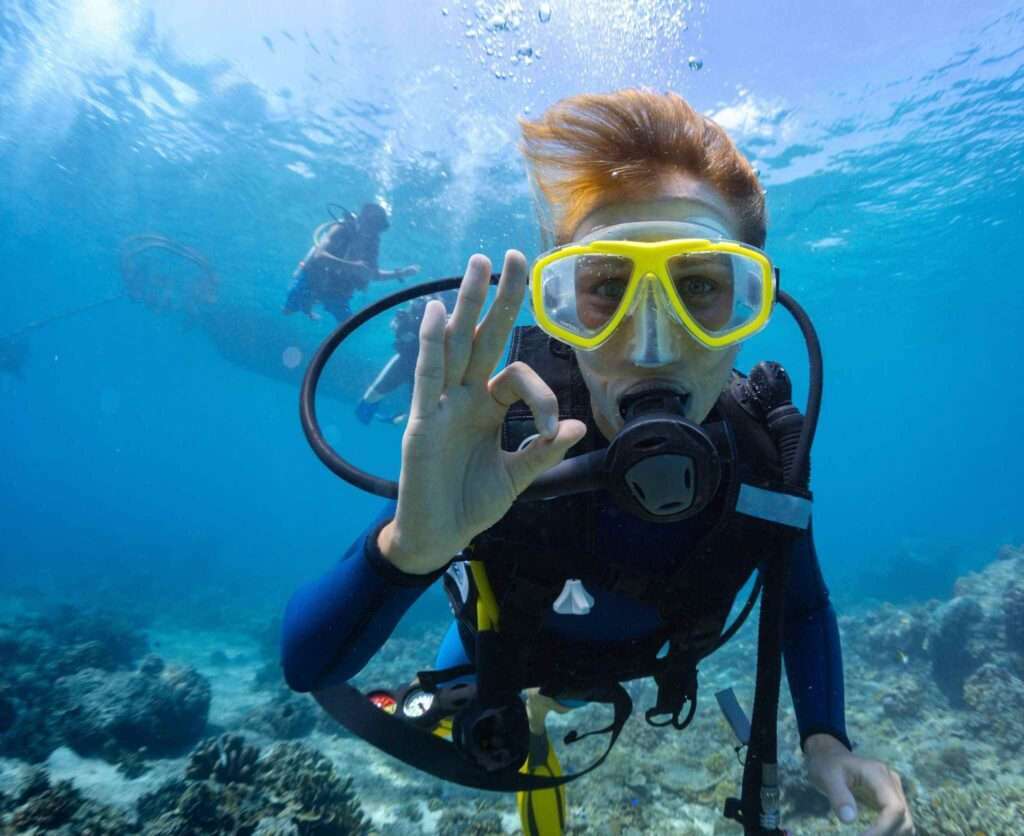
Scuba diving is an incredibly thrilling activity that allows you to explore a whole new world below the surface. However, it’s important to prioritize safety when planning a dive to ensure a safe and enjoyable experience. Here are some essential scuba diving safety tips to keep in mind:
Essential safety checks before diving
Before descending into the water, perform a thorough equipment check to ensure everything is in proper working order. Confirm that your tank is filled to the appropriate level and securely fastened to your BCD. Check your regulator, gauges, and dive computer to ensure they are functioning correctly. Review your dive plan with your dive buddy and communicate clearly to confirm understanding.
Decompression sickness prevention
Decompression sickness can occur when ascending too quickly from a dive, leading to pain, fatigue, and even death. To prevent decompression sickness, follow the proper ascent and safety stops recommended by your dive plan, as well as limiting your dive time and depth based on your skill level and physical condition.
Emergency situations and first aid
Despite the precautions taken, emergencies can still occur during a dive. Ensure you have first-aid training, and your dive buddy knows how to assist you in case of an emergency. Review emergency protocols before diving, including how to signal for help and procedures for assisted ascent.
The importance of proper planning and buddy systems
Scuba diving planning and preparation are key elements in ensuring your safety and comfort. Before heading into the water, review your dive plan, including maximum depth, bottom time, and safety stops. In addition, always dive with a buddy, maintaining communication throughout your dive to ensure a successful and safe dive.
Equipment maintenance
Scuba diving equipment can be a matter of life or death, and proper maintenance is essential to ensure everything works correctly. Keep your equipment clean, store it properly, and have it regularly serviced by a professional dive shop.
| Scuba Diving Safety Tips | Key Takeaways |
| Perform proper safety checks | Prevent equipment failure and ensure a successful dive. |
| Prevent decompression sickness | Limit dive time and depth and follow the correct ascent procedures to prevent decompression sickness. |
| Be prepared for emergencies | Have first aid training, review emergency protocols, and dive with a buddy to ensure a safe dive. |
| Proper dive planning and buddy systems | Ensure safety and comfort during your dive. |
| Equipment maintenance | Properly maintain your equipment to prevent failure and ensure a successful dive. |
Remember, scuba diving safety starts with proper planning, equipment check, and understanding of emergency protocols. By keeping these essential safety tips in mind, you can enjoy a safe and exhilarating underwater adventure.
Dive Like a Pro: Scuba Diving Tips
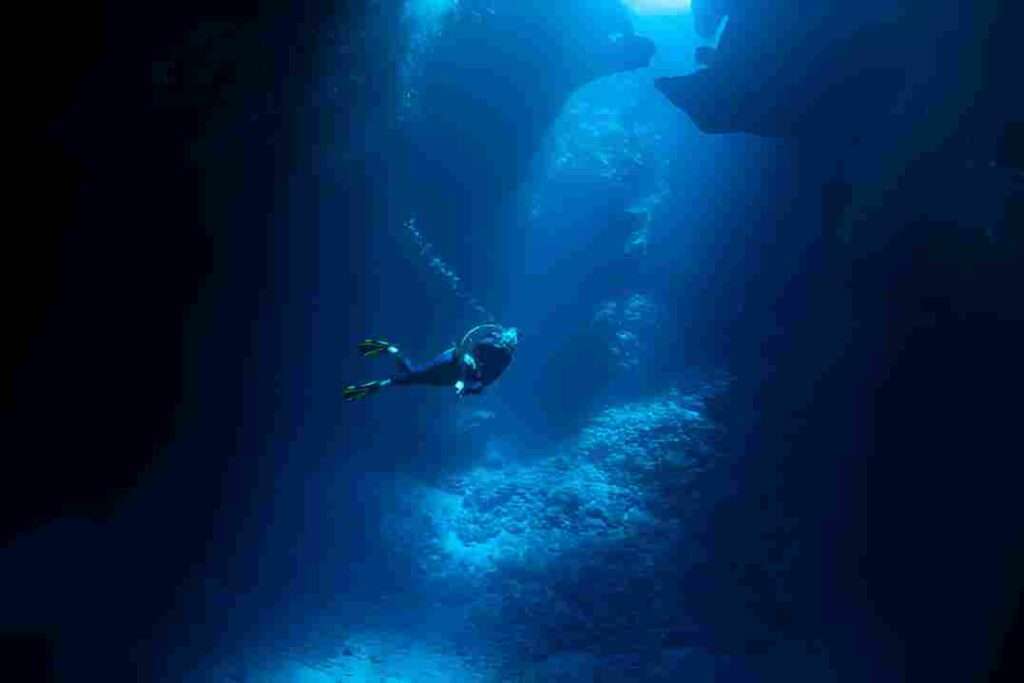
Scuba diving is an exciting adventure that allows you to explore the underwater world like never before. Whether you’re a seasoned diver or just starting out, there are always tips and tricks that can help improve your diving skills. Here are some scuba diving tips to help elevate your diving experience:
1. Focus on Buoyancy Control:
Mastering your buoyancy control is one of the most crucial skills to become a successful scuba diver. Practice hovering motionlessly and try not to touch the reefs or seafloor, as this can damage fragile marine life. You can use your lungs to control your buoyancy by inhaling to ascend and exhaling to descend.
2. Maintain Proper Breathing:
Breathing properly while scuba diving enhances your buoyancy control and conserves your air while underwater. Breathe slowly and deeply, exhale completely, and avoid holding your breath as it can lead to serious lung injuries such as barotrauma or decompression sickness.
3. Stay Fit and Healthy:
Scuba diving is a physically demanding activity, and maintaining a healthy and fit body is essential for a safe and enjoyable diving experience. Regular exercise, a balanced diet, and sufficient sleep can help improve your physical and mental well-being.
4. Master Underwater Photography:
Underwater photography is a great way to capture and share your scuba diving experiences with others. Invest in an underwater camera and take photos of the incredible marine life you encounter while diving. Experiment with different camera settings and techniques to capture stunning underwater photographs.
5. Choose the Right Dive Operator:
Choosing the right dive operator can make or break your diving experience. Before booking a diving trip, do your research and read reviews from other divers to find a reputable and experienced dive operator that prioritizes safety. Don’t be afraid to ask questions regarding the dive plan, safety measures, and equipment setup.
6. Stay Calm and Alert:
Scuba diving is a unique and exhilarating experience that requires focus and awareness underwater. Stay calm, alert and avoid touching or disturbing marine life. Remember to communicate with your dive buddy, always keep an eye on your gauges, and follow the dive plan.
By implementing these scuba diving tips, you can enhance your underwater skills and make the most out of your diving adventures. Stay safe and happy diving!
Dive into Paradise: Scuba Diving Vacations
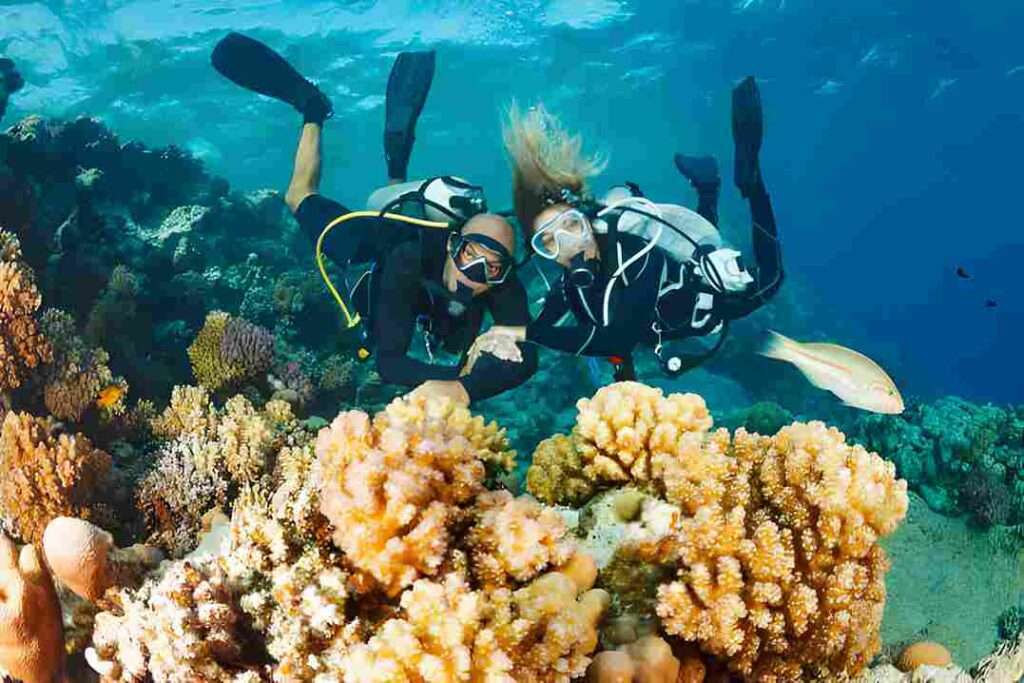
Scuba diving vacations are the perfect way to explore the wonders of the underwater world. But with so many diving destinations to choose from, planning the perfect trip can be overwhelming.
Top Scuba Diving Destinations
| Destination | Best Time to Dive | Notable Features |
| Bali, Indonesia | April to November | Shipwrecks, colorful corals, and diverse marine life |
| Great Barrier Reef, Australia | June to October | World’s largest coral reef system, turtles, sharks |
| Palau, Micronesia | January to April | Jellyfish lake, WWII shipwrecks, healthy reefs |
| Maldives | November to April | Manta rays, whale sharks, vibrant coral reefs |
| Cayman Islands | December to April | Grand Cayman wall, stingrays, shipwrecks |
These are just a few of the many breathtaking scuba diving vacation spots worldwide. When planning your trip, consider factors such as the weather, available dive operators, and accommodations.
Liveaboard Experiences and Dive Resorts
Liveaboards and dive resorts are popular options for scuba diving vacations. Liveaboards are boats dedicated to diving, allowing divers to visit multiple dive sites in one trip. Dive resorts often have in-house dive operators and offer dive packages that include accommodations and dive excursions.
When choosing a scuba diving vacation package, consider your preferences and needs. Do you prefer small groups or large ones? Are you an experienced diver or a beginner? What kind of marine life are you interested in seeing? Answering these questions will help you find the perfect dive package for your preferences.
With the right planning and preparation, a scuba diving vacation can be an unforgettable experience. Whether you’re exploring shipwrecks in Bali or swimming with whale sharks in the Maldives, a scuba diving vacation will leave you with memories that last a lifetime.
Dive Gear Essentials: Scuba Diving Equipment
Scuba diving equipment is essential to your safety, comfort, and overall diving experience. Knowing what equipment you need and how to properly use and maintain it is crucial before diving into the depths. Here are some must-have scuba diving gear:
- Dive computers: used to monitor your depth, time, and other information during your dive.
- Regulators: control the airflow from your tank to your mouthpiece.
- Wetsuits: keep you warm and protect you from sharp objects and stinging marine life.
- BCDs (buoyancy control devices): help control your buoyancy and allow easier ascent and descent.
- Dive masks: allow you to see underwater by creating an air pocket for your eyes.
- Dive fins: helps you move effectively underwater.
- Dive lights: provide light in darker waters so you can see more clearly.
- Underwater cameras: capture your underwater adventures and allow you to share them with others.
Dive Gear Essentials: Scuba Diving Equipment
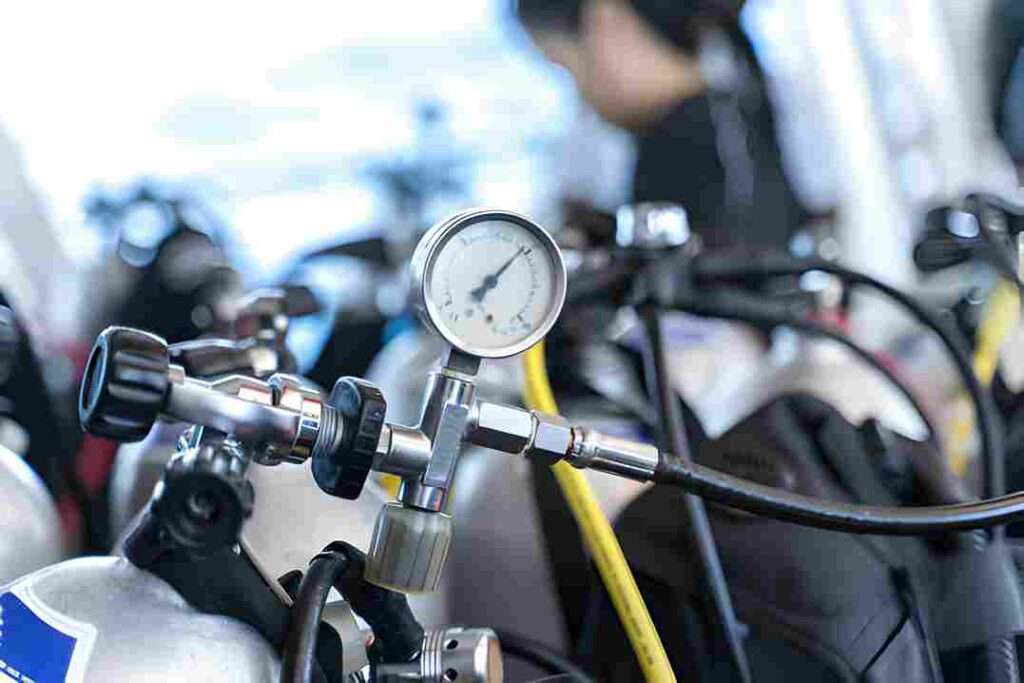
When it comes to scuba diving, having the right gear is essential for your safety and enjoyment. Let’s dive into some of the must-have equipment:
- Dive computer: This device helps you keep track of your dive time, depth, and nitrogen levels. It’s a crucial tool for planning and executing safe dives.
- Regulator: The regulator is what enables you to breathe underwater by reducing the high-pressure air in your tank to a breathable level. It’s important to choose a regulator that’s easy to use and comfortable to breathe with.
- BCD (Buoyancy Control Device): This device helps you control your buoyancy, allowing you to ascend and descend underwater with ease. Look for a BCD that fits well and has enough lift capacity for your weight and equipment.
- Dive mask and snorkel: A good quality mask and snorkel are essential for clear vision and comfortable breathing while diving.
- Dive fins: Fins help you move effortlessly through the water, conserving energy and reducing fatigue. Choose fins that fit securely and comfortably.
- Dive light: For night dives or exploring underwater caverns, a dive light is a must-have. Look for a lightweight but durable light that’s bright enough to illuminate your path.
- Underwater camera: Capture amazing memories of your diving adventures with an underwater camera. Choose a camera that’s rated for the depths you plan to dive and has clear and easy-to-use controls.
Remember to maintain and service your equipment regularly to ensure it remains in good condition and functions properly. With the right gear, you’ll be ready to explore the underwater world to its fullest potential!
FAQ
What scuba diving gear do I need?
Essential scuba diving gear includes masks, snorkels, wetsuits, and BCDs (buoyancy control devices). Additionally, you may need fins, dive computers, regulators, and dive lights, depending on your diving style and preferences.
Where can I take scuba diving lessons?
Scuba diving lessons are available at various dive centers, resorts, and certified training agencies worldwide. Look for instructors who are experienced and accredited by recognized organizations like PADI (Professional Association of Diving Instructors) or SSI (Scuba Schools International).
How do I become a certified scuba diver?
To become a certified scuba diver, you need to complete a scuba diving course and pass the associated exams and practical assessments. After successfully obtaining your certification, you will be able to dive independently or with a buddy, depending on the certification level you achieve.
What are some popular scuba diving locations?
Popular scuba diving locations include the Great Barrier Reef in Australia, the cenotes in Mexico, the Maldives, the Red Sea in Egypt, and the Galapagos Islands in Ecuador. These destinations offer diverse marine life, stunning coral reefs, and unique underwater experiences.
How can I ensure scuba diving safety?
Scuba diving safety can be ensured by conducting pre-dive safety checks, following proper dive planning procedures, maintaining equipment regularly, and diving with a buddy. It is also crucial to undergo appropriate training, practice good buoyancy control, and be aware of potential risks and emergency procedures.
What are some scuba diving tips for beginners?
Some scuba diving tips for beginners include practicing controlled breathing, improving buoyancy control, maintaining proper body position underwater, and communicating effectively with hand signals. It is also recommended to start diving in calm and shallow waters before progressing to more challenging dives.
Which are some popular scuba diving vacation destinations?
Popular scuba diving vacation destinations include the Maldives, Fiji, Thailand, the Caribbean islands, and the Philippines. These destinations offer a combination of stunning diving sites, beautiful beaches, and world-class dive resorts or liveaboard experiences.
What scuba diving equipment should I invest in?
Essential scuba diving equipment to invest in includes a mask, snorkel, wetsuit, BCD (buoyancy control device), regulator, and dive computer. Additional gear such as fins, dive lights, and underwater cameras can enhance your diving experience as you progress in your diving skills and preferences.
